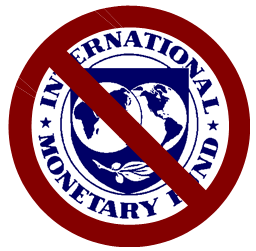NRD Editor’s Note: This column originally appeared in Investor’s Business Daily.
 By Bill Wilson — Legislation in both the U.S. House of Representatives and Senate will rescind an additional $108 billion that was extended to the International Monetary Fund by the Pelosi-Reid Congress in 2009. This is necessary to save taxpayer funds from being used to bail out bankrupt socialist states in Europe that refuse to get their houses in order — and the banks that foolishly lent them the money to begin with.
By Bill Wilson — Legislation in both the U.S. House of Representatives and Senate will rescind an additional $108 billion that was extended to the International Monetary Fund by the Pelosi-Reid Congress in 2009. This is necessary to save taxpayer funds from being used to bail out bankrupt socialist states in Europe that refuse to get their houses in order — and the banks that foolishly lent them the money to begin with.
World financial elites have asserted that doing so would have negative consequences. On March 7, the Washington Post breathlessly reported that the legislation “could restrict the IMF’s finances at a time when agency officials say they need a substantial boost to protect the world economy.”
To be clear, the legislation will leave $56 billion of U.S. quota money at the IMF, so the question becomes whether the IMF without the additional $108 billion will have enough cash on hand to meet its existing obligations in Europe and elsewhere.
On that count, according to the IMF’s Dec. 2011 balance sheet, it has $829 billion of total resources, $257 billion of which is committed, $143 billion actively lent, and an additional $422 billion available for lending at the moment.
That means even if taxpayers’ $108 billion were rescinded, that would leave about $314 billion in the Fund’s war chest for brand new commitments.
In other words, the Fund would still have more than enough to meet its current $257 billion of obligations, and several hundred billion more should the need arise.
Whether the IMF would prefer to expand its current resources so it might be capable of bailing out all of Europe is in part a political question. Congressional Republicans in 2010 pledged to “prevent Washington from forcing responsible taxpayers to subsidize irresponsible behavior by ending bailouts permanently,” something the American people emphatically oppose.
But it is also a question both of feasibility and practicality.
IMF director Christine Lagarde has said she is seeking an additional $500 billion in funding to cope with the spreading financial crisis globally. That would include an increase of the U.S. quota to $130 billion. Speaking in Berlin recently, Lagarde acknowledged the Fund does not have enough to save Italy or Spain should the need arise.
What she leaves out is that even with an additional $500 billion, the Fund still could not save Europe on its own. The combined debts of Portugal, Italy, Ireland, Greece, and Spain total more than €3 trillion. The IMF was never intended to bail out advanced economies in the first place. Rescinding the $108 billion will not change that reality — it could not save all of Europe if it wanted to.
To date, the IMF has committed €78.5 billion to Greece, Portugal and Ireland, €30 billion of which was marked for Greece. €47.37 billion of that has already been used, or $62.15 billion. That means an astounding 43 percent of the IMF’s outstanding loans have disproportionately gone to Greece, Portugal, and Ireland alone.
On March 15, the IMF Executive Board will be meeting to decide how much of the most recent €130 billion Greek bailout it will be providing. Reports suggest it could be as much as €18-21 billion. As the crisis spreads, the IMF is increasing the risks to U.S. taxpayers.
So far, close to $30 billion of the nation’s $164 billion pledged in quotas and New Arrangements to Borrow to the IMF have been used worldwide, accounting for about 20 percent of the IMF’s current lending. Since IMF monies are fungible, that means U.S. taxpayers have likely already shelled out over $12 billion propping up Europe, with more to come.
The bottom line is the IMF should not be in the business of acting as a lender of last resort for advanced economies, nor should U.S. taxpayers be on the hook for helping it to pretend that it somehow can. That will send a clear message to European nations they should be balancing their budgets and getting off the borrowing addiction, not waiting for bailouts.
Call it necessary, tough love.
Besides, if Italy and Spain ever enter the equation, it will be because of events beyond the IMF’s control.
At that point, Europe will have a much larger problem on its hands. The $108 billion will be irrelevant. Then, the solution will not be IMF bailouts, but an orderly breakup of the Euro system and defaults — which will not require U.S. taxpayer funding.
Bill Wilson is President of Americans for Limited Government. You can follow Bill on Twitter at @BillWilsonALG.






